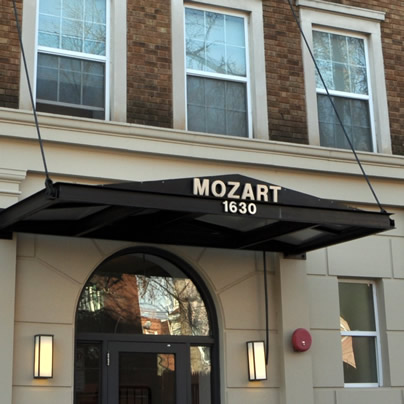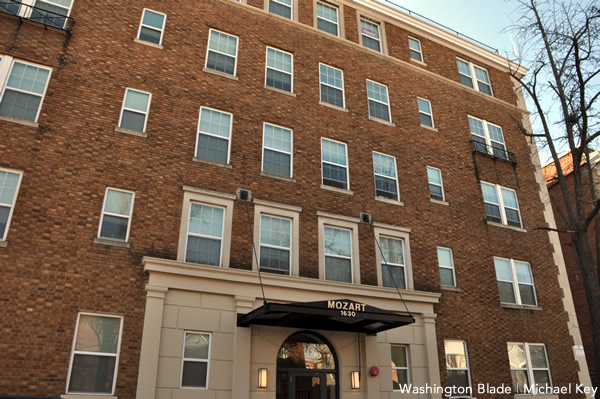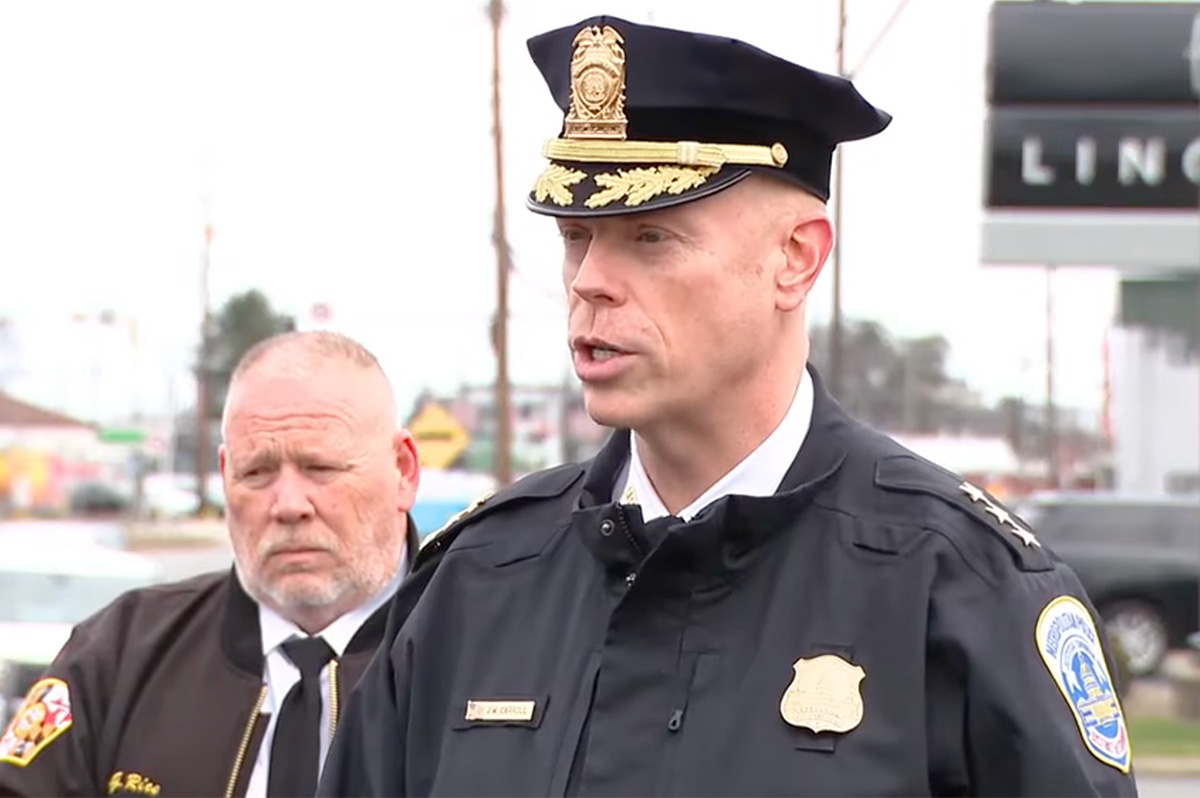Local
Prosecutor offers reduced charge in murder case
D.C. detective says 72-year-old victim paid roommate for sex


The victim was stabbed to death in his apartment at 1630 Fuller St., N.W. (Washington Blade photo by Michael Key)
Prosecutors have offered to lower the murder charge against a 21-year-old D.C. man arrested in February for allegedly stabbing his 72-year-old former roommate, Howard Venable, to death in exchange for a guilty plea.
At a May 8 status hearing in D.C. Superior Court, Assistant U.S. Attorney Holly Schick, the lead prosecutor in the case, said the government would lower the charge against David Jamal Wilson from second-degree murder while armed to voluntary manslaughter while armed if Wilson agrees to a guilty plea by May 31.
Judge Herbert B. Dixon Jr. scheduled another hearing for May 31, at which time Wilson is expected to disclose through his attorney whether he accepts the offer.
A D.C. police homicide detective testified at a Feb. 20 preliminary hearing that the murder took place a few days after Wilson moved out of the apartment and on the same day Wilson and Venable exchanged text messages arranging for Wilson to return to the apartment to engage in sex with Venable.
According to Det. King Watts, the two men had a longstanding arrangement in which Venable paid Wilson for sex every two weeks. Watts testified that Wilson and another witness whom police haven’t identified told police about the sex for money arrangement.
The Feb. 20 hearing took a dramatic turn when Wilson’s court-appointed attorney, Jacqueline Cadman, told the court that Venable and Wilson had been in a longstanding “abusive” sexual relationship since Wilson was a “child.”
Cadman introduced a motion calling for the charge against Wilson to be lowered to manslaughter because of the alleged abuse. But Judge Stuart Nash, who presided over the case at that time, denied the motion, court records show.
Court records show that on April 25 Wilson dismissed Cadman as his attorney and retained a new attorney, James W. Beane, who represented him at the May 10 hearing.
A D.C. police affidavit filed in court at the time of Wilson’s arrest in February says Venable’s body was found lying face down in a pool of blood on the floor of his one-bedroom apartment at 1630 Fuller St., N.W., in a building known as the Mozart.
The affidavit says an autopsy found “multiple slashing wounds” on Venable’s neck, minor cuts on both hands “consistent with defensive wounds,” and two stab wounds to his upper torso, one of which struck his aorta.
According to the affidavit, police discovered Wilson used bank cards he allegedly stole from Venable’s apartment to withdraw more than $600 in cash from ATMs in District Heights, Md., on the night of the murder.
Detectives found Wilson at a residence in District Heights on Feb. 3, and Wilson agreed to go with the detectives to the homicide branch offices in Southwest D.C. to undergo questioning about the case, the affidavit says.
It says he gave “numerous inconsistent accounts” of his involvement in the murder, including an account that unknown intruders stabbed Venable. In one version, Wilson said Venable threatened him with a kitchen knife and the two argued and he and Venable struggled over the knife. Wilson told detectives Venable fell on the knife during the struggle and stabbed himself, the affidavit says.
The autopsy, however, found that the nature of Venable’s multiple wounds confirms that he could not have stabbed himself and that the manor of death was murder.
Court records show that Wilson had at least two encounters with police and the courts prior to his arrest for Venable’s murder.
In August 2012 he and two other men were charged with armed robbery for allegedly stealing a bicycle from another man at knifepoint in Meridian Hill Park. The charge was dropped after the victim, who was to be the lead witness, failed to show up at the trial.
In July 2011, court records show Wilson’s wife filed papers seeking a civil protection order against him after he allegedly assaulted her in the apartment where the two lived with their two children.
At the Feb. 20 court hearing, then defense attorney Cadman said Wilson’s wife was in the courtroom to show her support for him and favored a defense motion to release Wilson on bond. Judge Nash denied the motion, ordering Wilson to remain in custody.
Members of the D.C. group Gays and Lesbians Opposing Violence (GLOV) have complained in the past that the U.S. Attorney’s office has unnecessarily lowered charges against defendants charged with acts of anti-LGBT violence. A GLOV spokesperson couldn’t immediately be reached for comment on the offer by the U.S. Attorney’s office to lower the change against Wilson.
D.C. attorney Dale Edwin Sanders, who represents clients in criminal cases, said concern about possible complications at a jury trial over the sexual relationship between Venable and Wilson may have prompted prosecutors to issue the plea bargain offer.
But Sanders said he doesn’t think reducing the charge would make a significant difference in the sentence Wilson would receive if Wilson accepts the offer.
He noted that second-degree murder while armed carries a maximum sentence of life in prison compared to a 30-year maximum sentence for voluntary manslaughter while armed. However, Sanders said the voluntary sentencing guidelines that most judges follow would likely provide a range of sentences that overlap between second-degree murder and manslaughter charges.
“I’m sure the guidelines would not call for life in prison on the Murder II charge,” Sanders said. “So the functional difference between the two would probably be modest if any … The issue is they aren’t giving anything away. They just have a different label on it but essentially he would be pleading guilty to a homicide.”
UPDATE: This story has been updated to reflect that Howard Venable was 72 at the time of his death. D.C. police initially reported that Venable was 68 in a press release in February at the time of the murder and the Blade reported that age before new information surfaced that he was 72.
District of Columbia
Kennedy Center renaming triggers backlash
Artists who cancel shows threatened; calls for funding boycott grow

Efforts to rename the Kennedy Center to add President Trump’s name to the D.C. arts institution continue to spark backlash.
A new petition from Qommittee , a national network of drag artists and allies led by survivors of hate crimes, calls on Kennedy Center donors to suspend funding to the center until “artistic independence is restored, and to redirect support to banned or censored artists.”
“While Trump won’t back down, the donors who contribute nearly $100 million annually to the Kennedy Center can afford to take a stand,” the petition reads. “Money talks. When donors fund censorship, they don’t just harm one institution – they tell marginalized communities their stories don’t deserve to be told.”
The petition can be found here.
Meanwhile, a decision by several prominent musicians and jazz performers to cancel their shows at the recently renamed Trump-Kennedy Center in D.C. planned for Christmas Eve and New Year’s Eve has drawn the ire of the Center’s president, Richard Grenell.
Grenell, a gay supporter of President Donald Trump who served as U.S. ambassador to Germany during Trump’s first term as president, was named Kennedy Center president last year by its board of directors that had been appointed by Trump.
Last month the board voted to change the official name of the center from the John F. Kennedy Memorial Center For The Performing Arts to the Donald J. Trump And The John F. Kennedy Memorial Center For The Performing Arts. The revised name has been installed on the outside wall of the center’s building but is not official because any name change would require congressional action.
According to a report by the New York Times, Grenell informed jazz musician Chuck Redd, who cancelled a 2025 Christmas Eve concert that he has hosted at the Kennedy Center for nearly 20 years in response to the name change, that Grenell planned to arrange for the center to file a lawsuit against him for the cancellation.
“Your decision to withdraw at the last moment — explicitly in response to the Center’s recent renaming, which honors President Trump’s extraordinary efforts to save this national treasure — is classic intolerance and very costly to a non-profit arts institution,” the Times quoted Grenell as saying in a letter to Redd.
“This is your official notice that we will seek $1 million in damages from you for this political stunt,” the Times quoted Grenell’s letter as saying.
A spokesperson for the Trump-Kennedy Center did not immediately respond to an inquiry from the Washington Blade asking if the center still planned to file that lawsuit and whether it planned to file suits against some of the other musicians who recently cancelled their performances following the name change.
In a follow-up story published on Dec. 29, the New York Times reported that a prominent jazz ensemble and a New York dance company had canceled performances scheduled to take place on New Year’s Eve at the Kennedy Center.
The Times reported the jazz ensemble called The Cookers did not give a reason for the cancellation in a statement it released, but its drummer, Billy Hart, told the Times the center’s name change “evidently” played a role in the decision to cancel the performance.
Grenell released a statement on Dec. 29 calling these and other performers who cancelled their shows “far left political activists” who he said had been booked by the Kennedy Center’s previous leadership.
“Boycotting the arts to show you support the arts is a form of derangement syndrome,” the Times quoted him as saying in his statement.
District of Columbia
New interim D.C. police chief played lead role in security for WorldPride
Capital Pride says Jeffery Carroll had ‘good working relationship’ with organizers

Jeffery Carroll, who was named by D.C. Mayor Muriel Bowser on Dec. 17 as the city’s Interim Chief of Police, played a lead role in working with local LGBTQ community leaders in addressing public safety issues related to WorldPride 2025, which took place in D.C. last May and June
“We had a good working relationship with him, and he did his job in relation to how best the events would go around safety and security,” said Ryan Bos, executive director of Capital Pride Alliance.
Bos said Carroll has met with Capital Pride officials in past years to address security issues related to the city’s annual Capital Pride parade and festival and has been supportive of those events.
At the time Bowser named him Interim Chief, Carroll had been serving since 2023 as Executive Assistant Chief of Specialized Operations, overseeing the day-to-day operation of four of the department’s bureaus. He first joined the D.C. Metropolitan Police Department in 2002 and advanced to multiple leadership positions across various divisions and bureaus, according to a statement released by the mayor’s office.
“I know Chief Carroll is the right person to build on the momentum of the past two years so that we can continue driving down crime across the city,” Bowser said in a statement released on the day she announced his appointment as Interim Chief.
“He has led through some of our city’s most significant public safety challenges of the past decade, he is familiar with D.C. residents and well respected and trusted by members of the Metropolitan Police Department as well as our federal and regional public safety partners,” Bowser said.
“We have the best police department in the nation, and I am confident that Chief Carroll will meet this moment for the department and the city,” Bowser added.
But Bowser has so far declined to say if she plans to nominate Carroll to become the permanent police chief, which requires the approval of the D.C. City Council. Bowser, who announced she is not running for re-election, will remain in office as mayor until January 2027.
Carroll is replacing outgoing Chief Pamela Smith, who announced she was resigning after two years of service as chief to spend more time with her family. She has been credited with overseeing the department at a time when violent crime and homicides declined to an eight-year low.
She has also expressed support for the LGBTQ community and joined LGBTQ officers in marching in the WorldPride parade last year.
But Smith has also come under criticism by members of Congress, who have accused the department of manipulating crime data allegedly showing lower reported crime numbers than actually occurred. The allegations came from the Republican-controlled U.S. House Oversight Committee and the U.S. Justice Department
Bowser has questioned the accuracy of the allegations and said she has asked the city’s Inspector General to look into the allegations.
Meanwhile, a spokesperson for the D.C. police Office of Public Affairs did not immediately respond to a question from the Washington Blade about the status of the department’s LGBT Liaison Unit. Sources familiar with the department have said a decline in the number of officers currently working at the department, said to be at a 50-year low, has resulted in a decline in the number of officers assigned to all of the liaison units, including the LGBT unit.
Among other things, the LGBT Liaison Unit has played a role in helping to investigate hate crimes targeting the LGBTQ community. As of early Wednesday an MPD spokesperson did not respond to a question by the Blade asking how many officers are currently assigned to the LGBT Liaison Unit.
Arts & Entertainment
2026 Most Eligible LGBTQ Singles nominations
We are looking for the most eligible LGBTQ singles in the Washington, D.C. region.

Are you or a friend looking to find a little love in 2026? We are looking for the most eligible LGBTQ singles in the Washington, D.C. region. Nominate you or your friends until January 23rd using the form below or by clicking HERE.
Our most eligible singles will be announced online in February. View our 2025 singles HERE.
-

 Photos4 days ago
Photos4 days agoThe year in photos
-

 Sponsored3 days ago
Sponsored3 days agoSafer Ways to Pay for Online Performances and Queer Events
-

 District of Columbia2 days ago
District of Columbia2 days agoTwo pioneering gay journalists to speak at Thursday event
-

 a&e features2 days ago
a&e features2 days agoQueer highlights of the 2026 Critics Choice Awards: Aunt Gladys, that ‘Heated Rivalry’ shoutout and more


















